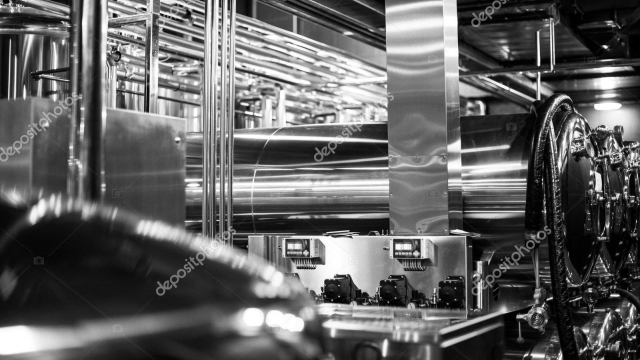Are you curious about what goes on behind the scenes to create the vibrant and flavorful beers that we all love? Look no further than the intricate world of brewery equipment. Whether you’re an aspiring brewer or simply interested in learning more about the fascinating process, understanding brewery equipment is essential. This comprehensive guide will unveil the secrets of brewery equipment, providing you with the knowledge to appreciate the artistry and precision that goes into crafting your favorite brews.
What exactly is brewery equipment, you may ask? Well, it encompasses a range of specialized tools and machinery specifically designed for the beer-making process. From the initial steps of mashing and fermenting to the final stages of packaging and kegging, brewery equipment manages every aspect of the production line. This equipment ensures consistency, efficiency, and quality in each batch, allowing brewers to create their signature flavors time and time again. With the right set of tools at their disposal, brewers can unlock a world of endless possibilities, experimenting with ingredients, flavors, and techniques to create unique and tantalizing brews.
In this guide, we’ll dive deep into the world of brewery equipment, exploring its different components and functions. From mash tuns and fermentation vessels to bottling lines and chilling systems, we’ll demystify each piece of the puzzle and shed light on its importance in the brewing process. Whether you’re a homebrewer dreaming of turning your hobby into a profession or simply a beer enthusiast wanting to deepen your appreciation, this article will be your go-to resource for understanding brewery equipment. So, grab a pint, sit back, and join us on this journey as we unveil the secrets of brewery equipment. Cheers to brewing bliss!
Introduction to Brewery Equipment
Brewery equipment plays a crucial role in the beer-making process, ensuring that every pint of liquid gold is crafted to perfection. From the initial stages of brewing to the packaging of the final product, brewery equipment is the backbone of any successful brewery. In this article, we will delve into the world of brewery equipment, exploring its importance and uncovering the secrets behind its operation.
So, what exactly is brewery equipment? Put simply, it encompasses the machinery, tools, and components that are required to transform raw ingredients into the wonderful elixir we know and love as beer. This includes equipment such as brewhouses, fermentation tanks, filtering systems, and bottling lines, to name just a few. Each piece of equipment plays a vital role in the brewing process, ensuring consistency, quality, and efficiency at every step.
A comprehensive brewery equipment guide is essential for both experienced brewers and those just beginning their journey into the world of beer production. Understanding the various types of equipment available, their functions, and how they interact with one another is crucial to achieving desired results. By gaining insights into the secrets of brewery equipment, brewers can optimize their operations, improve the quality of their brews, and ultimately delight their customers with exceptional beer.
So, fasten your seatbelts as we embark on a journey through the realm of brewery equipment. From the mash tun to the bright tanks, we will explore the inner workings of each component, shedding light on their significance and unveiling the secrets behind their operation. Whether you’re a beer enthusiast curious to know what goes on behind the scenes or an aspiring brewmaster looking to dive into the brewing industry, this article will serve as your trusty guide to the fascinating world of brewery equipment.
2. Essential Brewery Equipment
In the world of brewing, having the right equipment is crucial for creating delicious and consistent beverages. Whether you are a seasoned brewer or just starting out, understanding the essential brewery equipment is key. Let’s dive into three key pieces that every brewer should have:
Fermenters:

Fermenters are an essential part of the brewing process. These vessels are where the magic happens, as yeast converts sugars into alcohol and carbon dioxide. They come in various sizes and materials, such as stainless steel, glass, or plastic. Each has its advantages, but the primary goal is to provide an environment for optimal fermentation.Mash Tun:
A mash tun is where the grains are mixed with hot water to extract sugars in a process called mashing. This vessel helps create the foundation of your beer’s flavor and body. Mash tuns can range from simple coolers modified for brewing to professional-grade systems with built-in heating elements and recirculation capabilities.Brew Kettle:
A brew kettle is where the wort, the liquid extracted from mashing, is boiled and hops are added for flavor and aroma. It’s important to have a kettle that’s appropriate for your batch size and provides even heat distribution. Some kettles come with added features like built-in thermometers and valves for easier transfers.
These three pieces of essential brewery equipment are just the tip of the iceberg. Depending on your brewing setup and style, you may require additional equipment such as pumps, chillers, or kegs. However, having a solid foundation with fermenters, a mash tun, and a brew kettle will set you on the right path to brewing bliss.
3. Advanced Brewery Equipment
In the world of brewing, advanced brewery equipment plays a crucial role in pushing the boundaries of craftsmanship and innovation. These state-of-the-art tools have revolutionized the brewing process, allowing brewers to explore new flavors, refine their techniques, and create exceptional beverages. Let’s delve into some examples of advanced brewery equipment that are redefining the brewing landscape.
Automated Brewing Systems: Advanced brewery equipment includes cutting-edge automated brewing systems that streamline and optimize the brewing process. These systems integrate technology and precision to control various parameters like temperature, pressure, and fermentation stages. By automating critical steps, brewers can achieve consistent and high-quality results, maximizing efficiency and reducing the margin for error.
Fermentation Control Systems: To bring out the best flavors in beer, precise control over fermentation is essential. Advanced fermentation control systems provide brewers with the ability to monitor and adjust fermentation conditions with precision. These systems often include features like temperature control, oxygen and carbon dioxide management, and advanced monitoring tools. With such equipment, brewers can fine-tune their recipes and experiment with different fermentation profiles to create unique and complex flavors.
Beer EquipmentMicrobiological Testing Equipment: Maintaining the quality and safety of beer is of utmost importance to brewers. Advanced brewery equipment includes microbiological testing tools that help in monitoring and analyzing beer samples for potential contaminants or irregularities. These testing equipment enable brewers to detect and address any issues early on, ensuring that the final product meets the highest standards of quality and consistency.
In conclusion, advanced brewery equipment empowers brewers to strive for excellence in their craft. By embracing innovative technologies and tools, brewers can elevate the brewing experience, unleash their creativity, and deliver exceptional beer to their consumers. Cheers to the future of brewing with advanced brewery equipment!

















